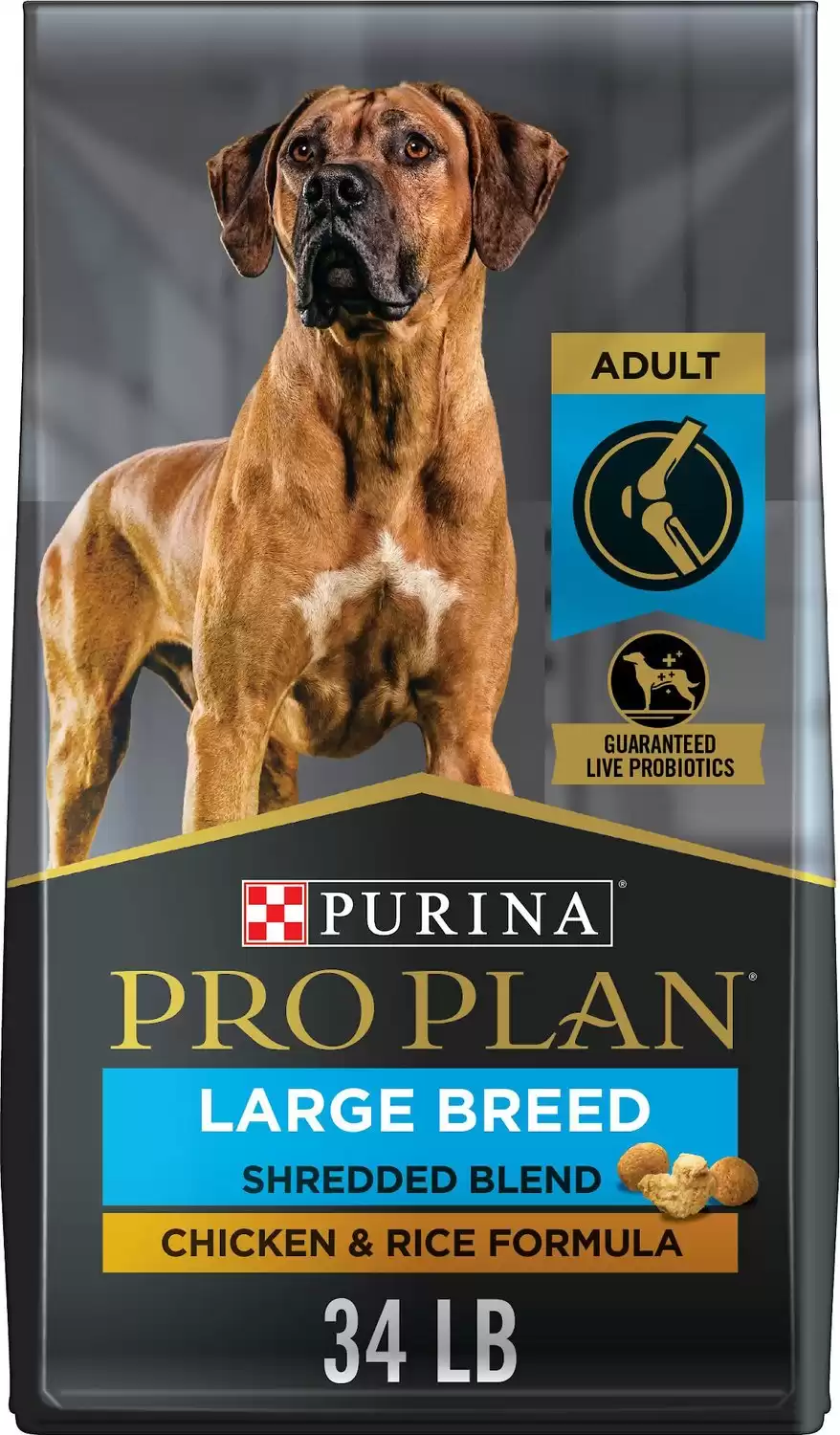Bernese Shepherd
Canis lupus
Bernese shepherds prefer cool climates
Advertisement
Bernese Shepherd Scientific Classification
- Kingdom
- Animalia
- Phylum
- Chordata
- Class
- Mammalia
- Order
- Carnivora
- Family
- Canidae
- Genus
- Canis
- Scientific Name
- Canis lupus
Read our Complete Guide to Classification of Animals.
Bernese Shepherd Conservation Status
Bernese Shepherd Facts
- Diet
- Omnivore
Bernese Shepherd as a Pet:
- General Health
- Energy Level
- Shedability
- Trainability
- Intelligence
- Tendency to Chew
- Size
- Family and kid friendliness
- Yappiness / Barking
- Moderate
- Separation Anxiety
- Moderate
- Preferred Temperature
- Cold climate
- Exercise Needs
- High
- Friendly With Other Dogs
- High
- Pure bred cost to own
- $500 to $1,000
- Dog group
- Working
- Male weight
- 80-110 lbs
- Female weight
- 75-90 lbs
This post may contain affiliate links to our partners like Chewy, Amazon, and others. Purchasing through these helps us further the A-Z Animals mission to educate about the world's species.
View all of the Bernese Shepherd images!
Bernese shepherds are intelligent, calm, and extremely good-natured giants with a strong work ethic and a desire to please.
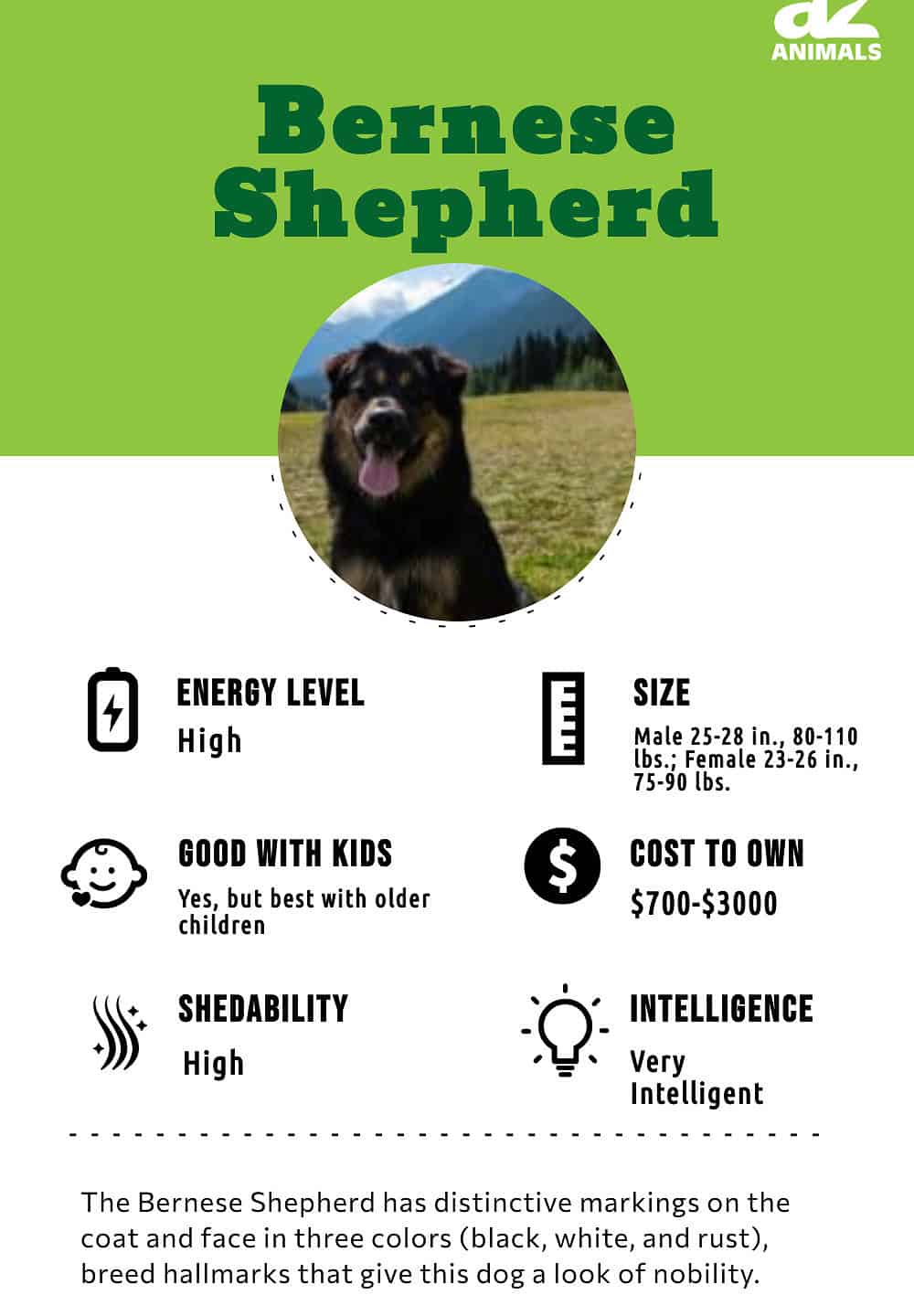
German shepherds are big dogs. Bernese mountain dogs are even larger. Cross these two canine lines, and the result is the Bernese shepherd, a gentle giant of a dog who is intelligent, calm, and extremely good-natured. This hybrid dog is sometimes referred to as the Euro mountain sheparnese. It’s recognized by the American Canine Hybrid Club, the Designer Breed Registry, the Designer Dogs Kennel Club and the Dog Registry of America.
See all of our expert product reviews.
The Bernese shepherd has inherited a strong work ethic from its two working dog forbearers. Members of this hybrid mix are happiest when you can give them a job to do, and they have plenty of outdoor space in which to perform the job. They have generous temperaments and a strong desire to please those who have won their affection.
3 Pros and Cons of Ownership
| Pros | Cons |
|---|---|
| They’re affectionate: If you’re looking for a big dog with a super-sized capacity for love, the Bernese shepherd is it. These huge hybrid canines love a snuggle and may even try to climb into your lap upon occasion. | They’re very big: Don’t think about owning a Bernese shepherd if you live in an apartment. This dog needs space. They do best on farms or in large country houses with plenty of outdoor acreages. |
| They’re great watchdogs: A Bernese shepherd’s sheer size alone is enough to intimidate people or animals who may want to do you harm. Apart from that, these hybrid canines are descended from two herding lines with strong protective instincts. They will literally risk their lives in defense of a loved one. | They’re expensive: Your monthly dog-owning costs will be high because big dogs eat more and require larger doses of routine medications like flea preventatives since such medications are dosed by weight. |
| They’re very intelligent: German shepherds and Bernese mountain dogs are both bright canines who are eager to please and relatively easy to train. Small wonder then that a crossbreed mix that combines these lineages demonstrates these characteristics as well. | They shed: If you’re looking for a hypoallergenic dog, look elsewhere. Shedding is a big-time problem with Bernese shepherds. |
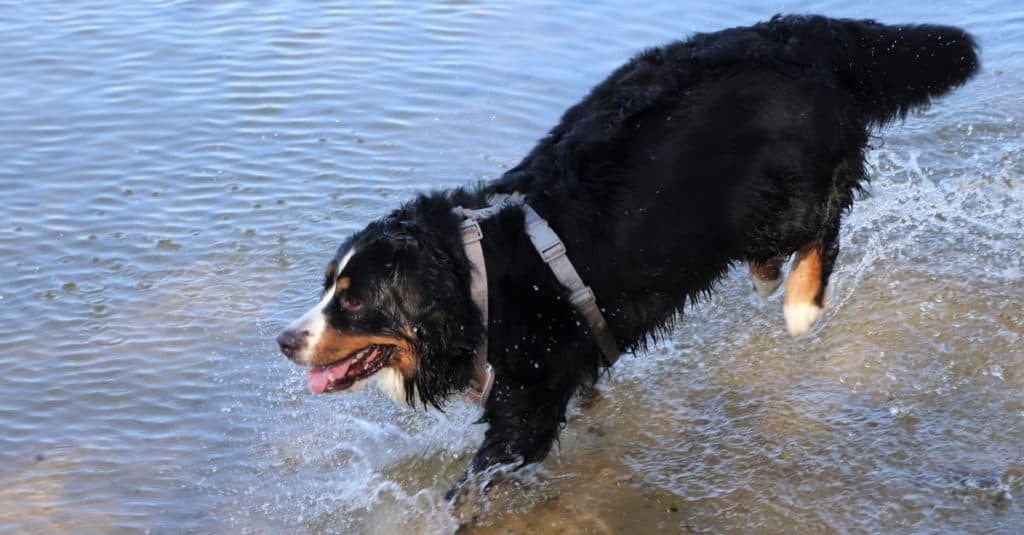
The Bernese Shepherd makes for a very intelligent, eager-to-please, and affectionate watchdog
©T. Miettinen/Shutterstock.com
Size and Weight
Bernese shepherds vary in height and weight, depending upon which parent line the dog most resembles. Generally, though, they are bigger than the average German shepherd but smaller than the average Bernese mountain dog. Adult males are noticeably taller and heavier than adult females.
| Height (Male) | 25 to 28 inches tall |
| Height (Female) | 23 to 26 inches tall |
| Weight (male) | 80 to 110 pounds |
| Weight (female) | 75 to 90 pounds |
Common Health Issues
Due to their large size and relative degree of inbreeding, German shepherds and Bernese mountain dog breeds are both prone to a number of health ailments. The average lifespan of the Bernese mountain dog is 6 to 8 years while the average lifespan of the German shepherd is 7 to 10 years.
Health and Entertainment for your Bernese Shepherd
See all of our expert product reviews.
Hybrid vigor gives these dogs a longer lifespan than either of its parent lines. Typically, these crossbreeds live 9 to 12 years. However, their genetics predispose them to a number of health issues. Hip and elbow dysplasia are common problems, as is bloat. Bernese shepherds may also be prone to a bleeding disorder called Von Willebrand’s disease, epilepsy, pancreatic insufficiency, certain types of cancers, progressive retinal atrophy and food allergies. Reputable breeders will make sure that genetic testing is done on all puppies they sell to minimize the risks associated with hereditary disorders. In summary, the potential health problems of the Bernese shepherd are:
- Hip and elbow dysplasia
- Bloat
- Von Willebrand’s disease
- Epilepsy
- Pancreatic insufficiency
Temperament
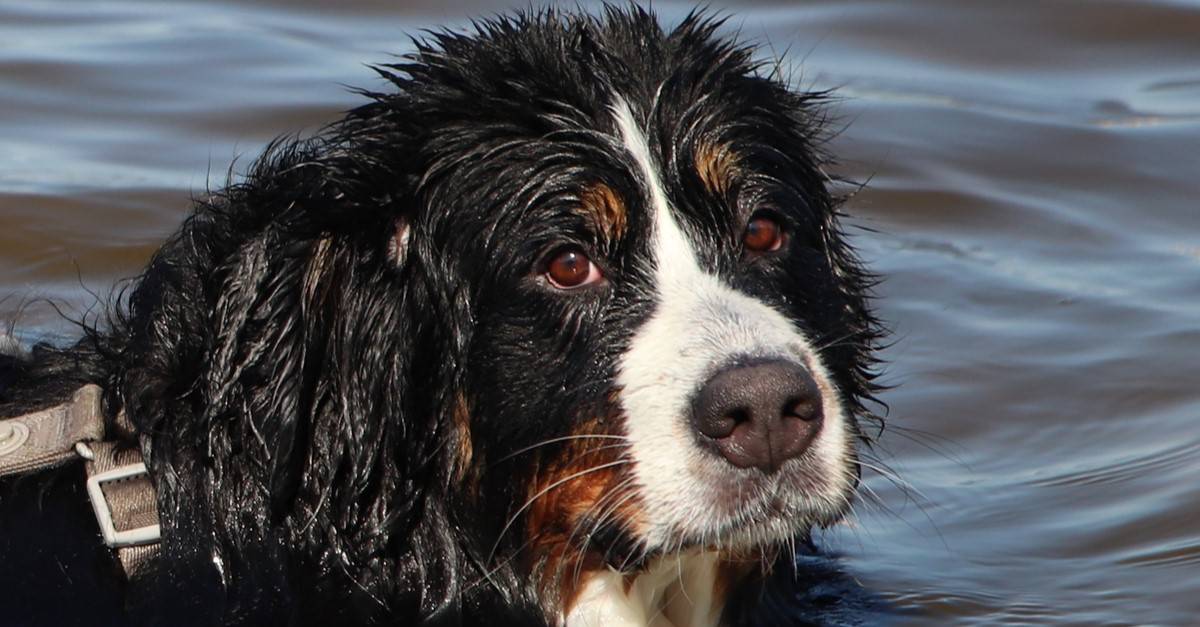
Bernese Shepherds want to work, but that can take the form of playing fetch and other games.
©T. Miettinen/Shutterstock.com
These dogs are highly intelligent and have a boundlessly friendly personality with those they know. They’re suspicious of unfamiliar humans and animals, though, and will check strangers out by barking and sniffing. If strangers pass the test, these dogs snap back to their best behavior again relatively quickly. These canines love to work. Since you probably won’t have a herd of sheep to put at their disposal, you’ll need to satisfy this urge by playing frequent games of fetch and devising other pastimes for them.
Although this canine’s temperament is gentle and loving, its sheer size is a trait that can be intimidating for owners without much prior canine experience, however, and for that reason, this crossbreed is not recommended for first-time dog owners. German shepherds can be stubborn, and some Euro mountain sheparnese dogs inherit this behavior. To counteract this tendency toward truculence, training and socialization should be started early.
Care
As a Bernese shepherd owner, you’ll have to take factors like your dog’s size, unique coat, and need for activity into consideration. Bernese shepherd puppies should begin obedience training the moment you introduce them to their new homes.
Best Dog Food
Adults require four to five cups of high-quality food every day. To minimize the threat of bloat, it’s best to divide this into two or three smaller meals and to stick mostly with a premium kibble. Since these crossbreed dogs are prone to developing food allergies, you might want to have your new puppy tested for dietary sensitivities. You’ll definitely want to avoid foods with additives.
At A-Z Animals, we believe the best dog food for Bernese Shepherds is Purina Pro Plan Large Breed Adult Dry Dog Food Chicken with Shreds.
In a formula just for the biggest canine friends, this is a well-rounded combo of real chicken with supplemental poultry ingredients supplying glucosamine and chondroitin for carefree, mobile joints. Your dog’s tummy will also thank you for the probiotics’ digestive benefits.
Check Chewy or Amazon for this product.
- Crunchy kibble combined with tender, shredded pieces for taste and texture dogs love
- High protein formula, with real chicken as the first ingredient
- Fortified with guaranteed live probiotics for digestive and immune health
- Used to be known as SAVOR Shredded Blend Large Breed Formula
- Glucosamine and EPA, an omega-3 fatty acid, for joint health and mobility
Maintenance And Grooming
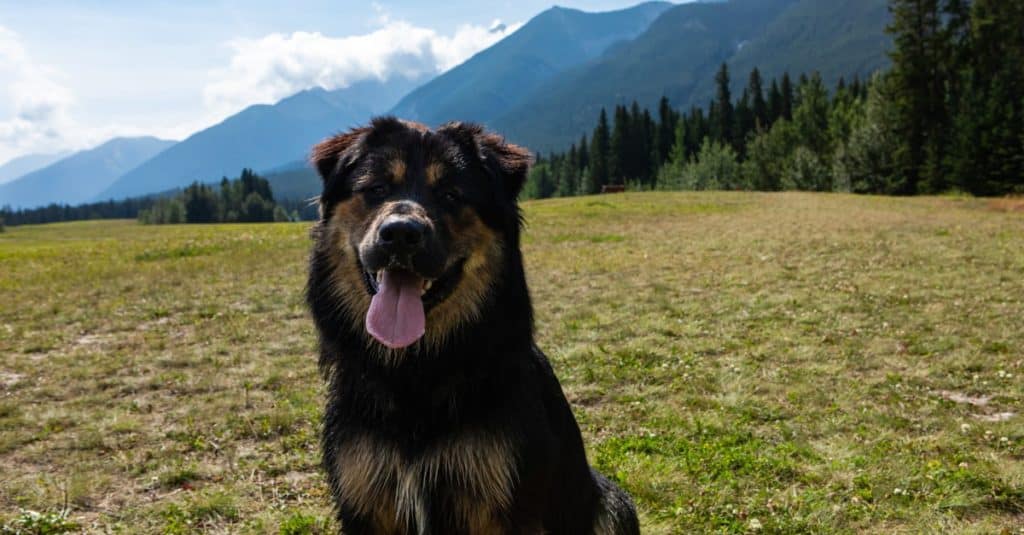
Caring for a Bernese Shepherd involves lots of brushing, effective training, and vigorous exercise.
©Valmedia/Shutterstock.com
Shedding can be a major issue with these dogs. German shepherds and Bernese mountain dogs both have thick, fluffy double coats. Small wonder that this breed prefers cooler climates! Although it’s impossible to predict whether your hybrid dog will inherit the German shepherd’s wiry, coarse outer coat or the Bernese Mountain dog’s softer, wavier outer coat, one thing’s for sure: He or she will need to be brushed thoroughly and regularly to remove loose hair if you don’t want shedding to get out of hand. A heavy bristle brush or a pin brush will work best. The long, feathery hair around this breed’s ears can be a magnet for dirt and debris, so check that area frequently.
These dogs don’t need to be bathed more often than once a month unless they’ve been actively getting into dirt. Lathering and rinsing your pet’s double coat can present a challenge. Brush your pet’s teeth once a day and clip nails as needed.
Training
Your Bernese shepherd has inherited strong pack instincts from its parent lines. Socialization and obedience training is critical to help your new pet understand that he or she is not the alpha of the pack. Smaller dogs may be able to get away with occasional behaviors like straining at their leashes or jumping up on people, but because of its size, your Bernese shepherd cannot. Forming a bond with your dog is the key to training this crossbreed because this dog is eager to please the humans he or she loves.
Exercise
These dogs have an intense need for activity and exercise; they won’t be satisfied with just a brisk walk around the block twice a day. Your pet will need at least two hours of vigorous activity every day, but three hours would be even better. These dogs are doers. They like to run, they like to hike, and they like to play. Enforce quiet time after eating, though; exercising your dog too soon after he or she has eaten can cause the development of bloat.
Puppies
Bernese shepherds are a relatively new breed, so breeders may be difficult to locate. Before you purchase a puppy, learn all you can about the health status of the puppy’s parents to minimize the possibility of adopting a pet with a predisposition toward genetic disorders.
Children
These dogs are friendly and, for the most part, gentle, but they aren’t the best dog for a family with young children. While they’re likely to tolerate a toddler who attempts to ride them, they may also unintentionally knock that toddler down when they’re bounding up to say hello. These canines also have strong herding instincts and may attempt to shepherd your little ones.
Similar Dogs
Rottweilers, Tibetan mastiffs, and akitas all share traits in common with the Bernese shepherd.
- Rottweilers: Some Bernese shepherds look almost exactly like Rottweilers. How can you tell them apart? Rottweilers have shorter legs, squarer faces, and thicker chests than Bernese shepherds.
- Tibetan mastiffs: DNA tests have revealed that Bernese mountain dogs are actually descendants of Tibetan mastiffs. Tibetan mastiffs are one of the most ancient of all canine breeds; they herded the nomads’ flocks and kept guard over the Buddhist monasteries.
- Akitas: Akitas have the same muscular build as Bernese shepherds, but their coats and coloring are very different, plus they have webbed toes and a distinctive tail that curves back over their bodies. Akitas are the national dog of Japan.
Popular Names
Popular names for these dogs include:
- Max
- Lino
- Elias
- Amelia
- Mia
Bernese Shepherd FAQs (Frequently Asked Questions)
How much do Bernese Shepherds cost to own?
If you can find Bernese shepherd puppies for sale, the price of a new puppy is likely to run from $500 to $1,000. Throw in the price of vet visits for vaccinations, neutering, and microchipping, plus the price of all the canine equipment you’ll need like crates, leashes, bedding, training and toys, and first-year costs could easily be more than $2,500. Because of their size, monthly food bills for Bernese shepherds can easily top $100 a month, so annual bills will run between $1,200 and $1,700.
Are Bernese Shepherds good with kids?
Bernese shepherds make ideal pets for active children who are older than 10 years.
How long do Bernese Shepherds live?
The average lifespan of a Bernese shepherd ranges from 9 to 12 years.
What is a Bernese Shepherd?
A Bernese Shepherd is a cross between a German shepherd and a Bernese mountain dog. Another name for this hybrid dog is Euro mountain sheparnese.
What does a Bernese Shepherd cost?
Bernese shepherd puppies cost between $500 and $1,000.
How long does a Bernese Shepherd live?
Bernese shepherds can live to be 12 years old, but their typical lifespan is 10 years.
How big does a Bernese Shepherd get?
Male Bernese shepherds can grow as tall as 28 inches and weigh as much as 110 pounds.
Thank you for reading! Have some feedback for us? Contact the AZ Animals editorial team.
Sources
- Wag Walking, Available here: https://wagwalking.com/breed/euro-mountain-sheparnese
- The Dog Digest, Available here: https://www.thedogdigest.com/bernese-mountain-dog-german-shepherd-mix/#Appearance_Personality_and_Traits_of_a_Bernese_Mountain_Dog_Crossed_with_German_ShepherdEuro_Mountain_Sheparnese
- Doggie Designer, Available here: https://doggiedesigner.com/euro-mountain-sheparnese/
- Dog Temperament, Available here: https://www.dogtemperament.com/bernese-mountain-dog-german-shepherd-mix-euro-mountain-sheparnese/
- Love Your Dog, Available here: https://www.loveyourdog.com/bernese-mountain-dog-german-shepherd-mix/
- Bernese Love, Available here: https://www.berneselove.com/bernese-mountain-dog-german-shepherd-mix-meet-the-euro-mountain-sheparnese/
- Anything German Shepherd, Available here: https://www.anythinggermanshepherd.com/everything-you-need-to-know-about-the-bernese-shepherd/
- How To Train The Dog, Available here: https://howtotrainthedog.com/euro-mountain-sheparnese/
- The Dog Digest, Available here: https://www.thedogdigest.com/bernese-mountain-dog-german-shepherd-mix/





